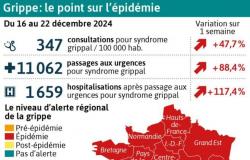Already 25 years since the year 2000. Duty takes us back in December to a quarter of a century punctuated by significant events and new trends that are still shaping our society. In this article: the place of paper books in an increasingly digital world.
In the digital age, where content flies before the eyes before getting lost in the clutter of the Web, the paper book becomes a rare and precious object. It has a beginning and an end. It extracts us from the ambient cacophony for the duration of a reading. This physical experience of the paper book, even young people from Generation Z, born in the digital age, still seem to appreciate it. But is the paper book about to become an object of nostalgia, a bit like vinyl?
In any case, its end is not for tomorrow. Sales of digital books have plateaued at 7%-10% of production for years, according to data from the National Association of Book Publishers (ANEL). This would also be true in France, where young people who received a “Culture pass” from the government apparently spent 60.2% of it in bookstores, to the detriment of the performing arts, moreover.
At the neighborhood bookstore La Maison des Feuilles, customer Marie-Noëlle Durivage likes paper books. “I like the contact, the smell of books. I spend so much of my life in front of a screen that I like to use something real. » Lucile Lesieur, illustrator, appreciates the colors that come with paper books. But at home, she has a Kindle, which displays books in black and white. “I use the Kindle more for the practical side. I'm an insomniac, and this allows me to read without turning on the lamp, so as not to disturb my husband. Plus, when I travel, it's lighter than books. »
The digital revolution in books takes place in libraries, where reading is free, and all in the form of loans.
At the Grande Bibliothèque, for example, loans of digital books and those of paper books are now equal. And according to data from a study carried out by Bibliothèque et Archives nationaux du Québec, it is older readers who are the most eager for digital books. It must be said that these books can save them a trip to the library, in addition to allowing characters to be enlarged for a presbyopic person, for example. “It’s something that perhaps seems counterintuitive, but young people are not the ones who read the most digital books,” notes Mélanie Dumas, director of collections at the Grande Bibliothèque. In the use we see, it is more people who are older who borrow them: in their fifties, sixties, many young retirees. So, these are not the people who were born with digital technology in their hands. »
Mme Dumas saw digital books appear in libraries around 2007. “Initially, these were collections that came from France or American platforms. But since 2012, we have had digital loans, and that has really accelerated the pace. For the year 2023-2024, we recorded as many loans of digital books as loans of physical books. » And certain books, particularly in the scientific field, where updates are frequently necessary, are only available in digital version, she notes.
In terms of digital loans, audio books, which we listen to while jogging or driving, are the most popular. The Grande Bibliothèque currently has around 6,000. “It is the publisher who chooses a narrator, who can be the author. And we are told the book. It's a bit of a new phenomenon. There is really a craze, continues Mélanie Dumas. In recent years, there has also been greater production in Quebec, particularly with the financial support received from the federal government. »
The perfect digital book
It is the publishers who must finance the production of digital books in their different forms. “We have to prepare these files [informatiques] there, explains Geneviève Pigeon, president of the National Association of Book Publishers (ANEL). Before sending a book to print, we have a [fichier] PDF that is ready to be uploaded. On the other hand, as soon as we talk about an ePub — a book that can be adapted for e-readers — we have to make a different file, which can be purchased or borrowed. This represents costs for publishers, for books which will essentially be borrowed. So, the digital book market, in terms of profitability or number of purchases, has never exploded as we were told 25 years ago. »
Technology itself can be a barrier to digital book consumption. Some formats are not suitable for certain e-readers, among others. More accessible in principle, digital culture evolves in an inhuman language, often stuck in a maze of forgotten passwords and applications that have become obsolete.
“As an object, the book is first and foremost a sensual experience before being an intellectual adventure,” writes Miguel Tremblé in the latest issue of the magazine. Freedom, entitled “Paper, defense of imperfect love”. The sense of touch doesn't lie. And digital books, because you can modify their format as you wish, do not provide the layout treasures found in the publishing of art or poetry books. Also, amid the surge of content generated by artificial intelligence, paper books inspire confidence, he notes: “What is printed is not made for machines, but for humans. »
The human before the algorithm
In a recent study by the National Institute of Scientific Research on the discovery of cultural content in Quebec, scientists noted that when it comes to books, Quebecers prefer to draw inspiration from their personal circle rather than relying on algorithms . Regarding the latter, the researchers note that “several participants are wary of them and [que] some adopt a posture of resignation towards them”, judging that the algorithms are “devoid of sensitivity and that it is a marketing device that is not trustworthy”.
They continue: “Digital resources are often mobilized by participants in an informational logic – in order to find precise information – while calling for critical discernment regarding the validity of this information obtained. »
Geneviève Pigeon, from ANEL, encourages vigilance towards platforms which sometimes illegally offer free digital books. “There are people who, without knowing it, will participate in fraud. There are a lot of documents circulating, free PDFs, which are illegal. All of this contributes to the fact that artists and publishers will lose a lot of money. »






